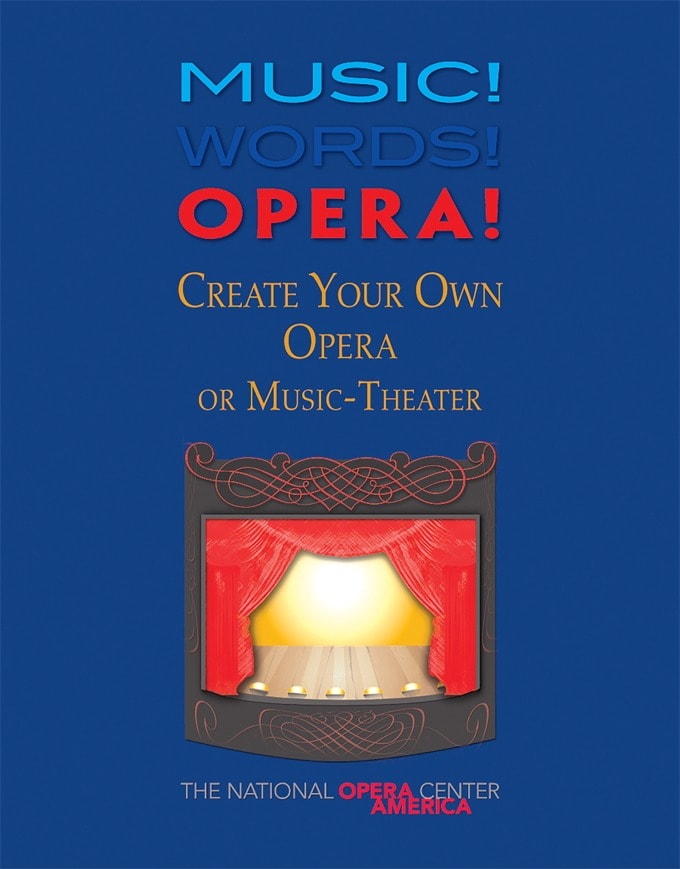/ News Posts / Telling Stories with Music! Words! Opera!
Telling Stories with Music! Words! Opera!
by Margaret “Meg” Ozaki Graves, sponsored by Opera Theatre of Saint Louis
“[Music! Words! Opera!] is about something very basic: the human need to tell stories.”—Roger Ames and Clifford J. Brooks
Now more than ever, music educators are poised to embrace whole student education in the classroom space, be it in-person or hybrid or virtual spaces. I’m here to share Music! Words! Opera! (MWO) from Opera America, a flexible curriculum that provides 21st century learners a platform to share stories through the integrated arts and a creative process-driven space in which to feel valued and empowered.
“No matter how old we are, we all rely to some extent on our ability to spin tales. It is one of the ways that we create our worlds each day…. Just as important, certainly, is our capacity to enter into other people’s stories. With the help of these storytellers’ imaginations, we can meet intriguing characters—that transport us to other worlds and times… Through these experiences, we learn about ourselves, other people, and the world in which we live.”
“Music! Words! Opera! introduces students to opera and music theater as something that can be understood and enjoyed by everyone. Because it is a multi-art form, opera invites students to explore several of the basic ways humans communicate—through words, music, dramatic expression, and visual arts. As a form of human expression, opera challenges students to reach beyond speaking and writing, and to think more comprehensively about their own ability to express and to communicate.”
—excerpted from the introduction to Music! Words! Opera! Create and Produce Your Own Opera or Music-Theater, by Roger Ames and Clifford J. Brooks, developed by Opera America and published by GIA Publications, Inc.
PROCESS-DRIVEN CREATIVE WORK
Creating and producing performative musical programs IS a great undertaking. The addition of writing and composing original content for performance may seem unsurmountable. MWO turns that around. Process is much more important than final product in this work. The point is to allow students space to collaborate creatively, identify with the characters of a story, and gain self-worth through accomplishment in the development of their own ideas.
INTEGRATIVE, MULTI-DISCIPLINAL & EXPERIENTIAL APPLICATIONS OF RESEARCH, WRITING & COMPOSITION
Through the process of deciding on a story plot, students’ research is driven by students’ passions. Little-known true stories from history, folk tales and traditions from cultures outside of Western art music, and curricular connections to other disciplines—such as the lifecycle of a butterfly or the history of algebra—are all welcome. Students center their work around what inspires them, including stories that are historically absent from traditional music theatre. It presents teachers with a great opportunity for culturally responsive teaching. By digging into these subjects (research), creating a narrative (writing), and devising a dramatic musical story using their own words and musical ideas (composition), students will never forget what they’ve learned. By centering story around what is relevant to them, students will see themselves reflected in the work and gain empowerment and belonging. By working together and collaborating in this curriculum inclusively, students will build empathy and find an outlet and application for social and emotional learning.
IMPORTANT INSTRUCTIONAL ELEMENTS FOR CREATIVE WORK
Whether the MWO curriculum is applied to individual or ensemble, instrumental or vocal music, independent or collective work, or via in-person, hybrid, or virtual classrooms (via web-based sound production software), use these Important Instructional Elements for Creative Work as a guide.
- Provide a realistic timeline for the creation of your class’s work, and be flexible with deadlines as needed
- Respect the concerns of your students and provide them the time and space to address sophisticated ideas on their own terms
- Challenge and inspire your students; praise them freely, but honestly
- Create a safe space for collaboration, where you can take learning and creative risks along with your students
- Be artistic along with your students
—excerpted from Ames and Brooks, p. 10.
MWO PROFESSIONAL DEVELOPMENT FOR TEACHERS
Opera companies across the country work with teachers and teaching artists to bring the MWO experience to students, schools, and communities through partnerships and collaborative residencies. Teachers interested in a hands-on approach can experience this process-driven curriculum before taking it to students. This summer NAfME is featuring Music! Words! Opera! Virtual Workshop for Educators as one of its Summer Learning Opportunities. Opera Theatre of Saint Louis and Central City Opera—two flagship organizations of MWO training—are partnering to present this virtual professional development workshop.
DETAILS ON MUSIC! WORDS! OPERA! VIRTUAL WORKSHOP FOR EDUCATORS
- Learn to create and produce original musical works in the classroom.
- Discover arts integration strategies for core subjects.
- Engage with fellow educators from around the country.
Join us for an interactive exploration in creating and producing original musical works from the K–12 student perspective and discovering arts integration strategies for the classroom through Mozart’s fairytale masterpiece The Magic Flute. National trainers Jeffrey Gilden, Neil Ginsberg, and Ilasiea Gray will lead the four-day workshop which is open to educators and teaching artists from all disciplines! Learn more.
About the author:

Image by Amanda Tipton Photography | FB- Amanda Tipton-Photographer | IG – @amandatiptonphotography
Margaret “Meg” Ozaki Graves is the Education Coordinator at Central City Opera. She holds Bachelor and Master of Music degrees in vocal performance from Lawrence University and the University of Cincinnati College-Conservatory of Music (CCM), respectively, and a Doctor of Musical Arts in vocal and opera performance studies with a cognate in Japanese aesthetics and music from CCM. Additionally, she holds a Certificate in Diversity and Inclusion from Cornell University. Ozaki Graves’ scholarly interests include Japanese lyric diction, the works of Minoru Miki and his theory of konketstu (cultural mixture), Japanese aesthetics and music, applied vocal studies, opera education for the young, and issues of diversity, equity, and inclusion in the field of opera. Her work is published in the NATS Journal of Singing, Nikkei Today, and Discover Nikkei, an online media periodical of the Japanese American National Museum. She’s taught applied vocal studies at Ithaca College, UW-Milwaukee, CCM and CCM Prep Department, and Lawrence Academy of Music and has served as a music instructor for students of all ages, from early childhood through higher ed.
Did this blog spur new ideas for your music program? Share them on Amplify! Interested in reprinting this article? Please review the reprint guidelines.
The National Association for Music Education (NAfME) provides a number of forums for the sharing of information and opinion, including blogs and postings on our website, articles and columns in our magazines and journals, and postings to our Amplify member portal. Unless specifically noted, the views expressed in these media do not necessarily represent the policy or views of the Association, its officers, or its employees.
June 2, 2021. © National Association for Music Education (NAfME.org)
Published Date
June 3, 2021
Category
- Culturally Relevant Teaching
- Music Education Profession
- Music Educator Workforce
- Social Emotional Learning
Copyright
June 3, 2021. © National Association for Music Education (NAfME.org)






